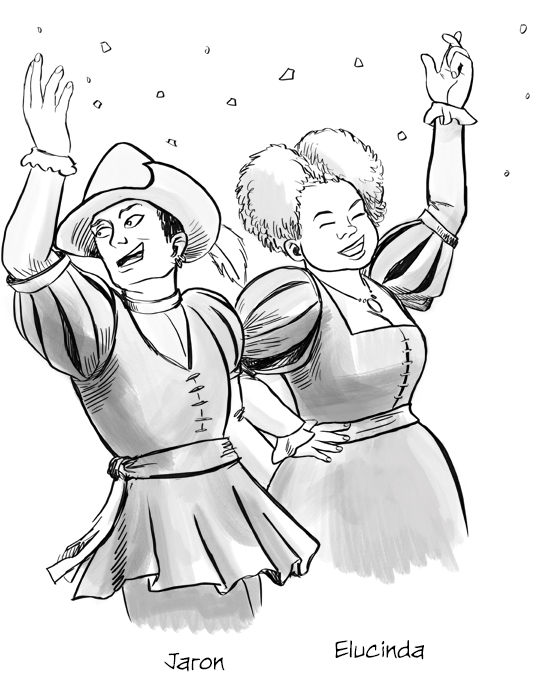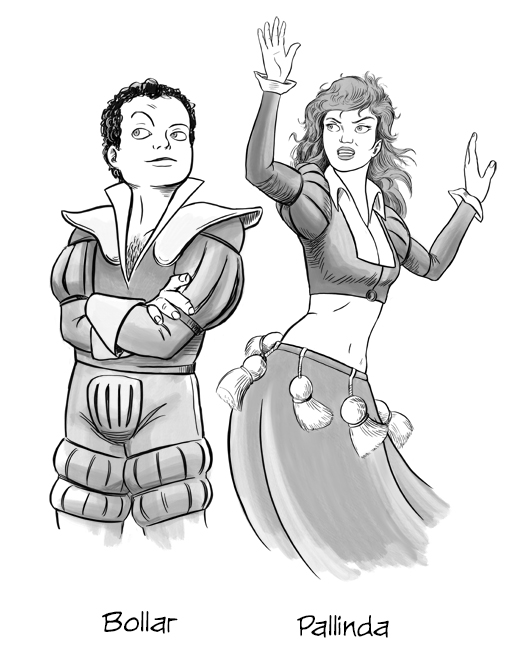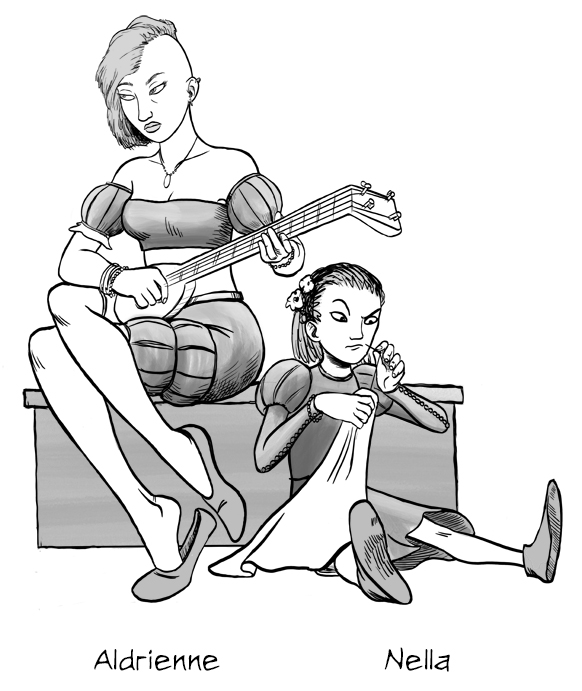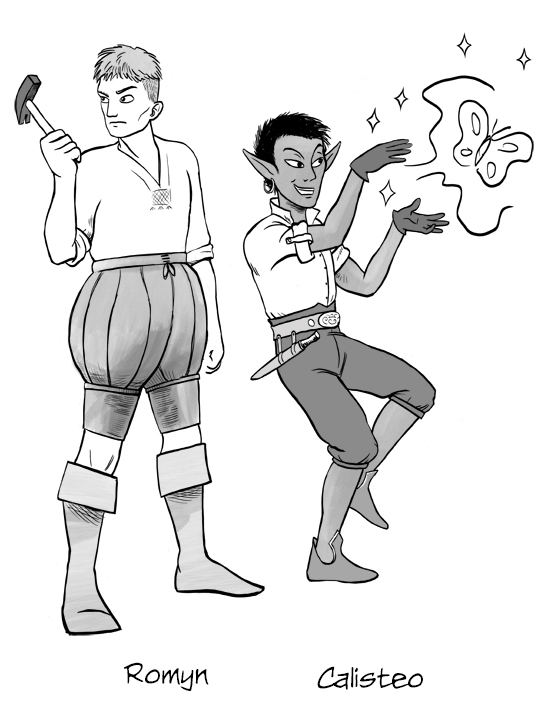
The Actor Troupes of Darokin
by Lost Woodrake from Threshold Magazine issue 26[The following is modeled after the commedia dell’arte troupes which flourished in Renaissance Italy, with republican Venice at its epicenter, so Darokin seemed appropriate. I removed the masks, which are the defining trait of the original commedia, but retained the notion of improvisation and the recurring types or roles (although I changed their names and, at times, their characteristics as well). I also added another dramatic genre, akin to Renaissance pastoral drama. These were not commonly part of the repertoire of commedia troupes, but seemed fitting to the Known World.]
The celebrated wandering actor troupes of Darokin can be found across the Republic, travelling in their wagons along the main routes of commerce, performing in taverns and inns, erecting their stages in town squares, or opting for more respectable venues in the large cities. These troupes are often composed of family members, with one generation training the next in the tricks of the trade. Others at times join the core family to create larger and more varied companies. In the more dangerous wilderlands of Darokin, troupes will usually be found accompanying merchant caravans for protection, offering entertainment in the evenings in return, while everyone sits around the campfire.
Actors are paradoxically both celebrated and shunned by Darokin society. They are admired and sometimes famous, but no respectable merchant father or mother would want their child to become one. Their profession is considered dishonorable, their alleged sexual promiscuity infamous, and their vagrant lifestyle unsettling. Therefore, actors are either already born into families of actors, or join them from the copper class ranks of society, who have little to lose in terms of honor and much to gain in terms of money and artistry. They often marry within themselves (if they marry at all), and create their own subculture in Darokin society. Actors from the silver class and higher are extremely rare and usually scandalous and find themselves disowned by their houses.
The troupes of Darokin are famed for their improvisational skills. The actors do not stage written plays, as in the playhouses of Ierendi or Specularum, but rather devise in advance a general outline of a plot, known as a scenario, which they further develop on the spot during the live performance itself. In rehearsals, they memorize huge chunks of materials: pieces of dialogue, physical humor, intricate labyrinthine monologues alongside one-liners, songs and dances. These allow them to improvise seamlessly with their partners during the show, by evoking materials from their memory as suits the spontaneous situation. Actors also need to be skilled in dancing, singing, musical instruments, storytelling and acrobatics.
Actors as adventure hooks: travelling throughout the country, actors are an excellent source of information. As they predominantly perform in taverns and streets, but are also sometimes invited into the manors of the wealthy, they get a view of the various strata of society that is more diverse than many others. Some of them have surprisingly close connections to the elite of Darokin. Actors often incorporate recent events into their improvised shows, and therefore serve to spread news (albeit in an over-dramatized version) as well as sly political commentary on the current situation.
The Plays
Two dramatic genres are prevalent in the Darokin troupes’ repertoire: City Comedies and Forest Scenes. The former follow the lives and loves of bourgeois merchant families and their servants, with farcical, outrageous and convoluted plots, almost always set in Darokin City (even when the show itself is staged elsewhere). The latter are pastoral plays, more poetic in style and at times even tragic. They are set in the Canolbarth (from which the Alfheim elves are always curiously absent) and center on fauns and dryads. The humorous tone of City Comedies allows performers and audiences alike to address the underlying tensions in their seemingly sunny plutocratic republic. Rivalries between merchants, intergenerational and class conflicts, racial and regional prejudices, unconventional gender and sexual behavior, and the emotional and social toll of Darokin’s wealth-centered worldview are all acknowledged on the theatre’s comic stage in ways that are relatively absent elsewhere in Darokin’s public discourse. Much can be spoken while framed as “mere play” and in jest. Forest Scenes, on the other hand, offer their audiences an escape to the bucolic world of the woods. The tales of the sylvan creatures seem far removed from the everyday life of Darokin towns and villages, and serve as a charming alternative to the Republic’s urbane mercantilism.
Both genres display a set of stock characters, or “roles”, types that recur in almost every play of all troupes. These roles always have the same name, and usually some piece of costume or stage-prop that defines them. Thus, spectators can quickly recognize who these characters are and what to expect from them, although some troupes might choose to subvert such expectations. Actors often specialize in particular roles which become identified with them, so that each troupe needs to have a variety of performers to be cast in all central roles.
In the City Comedies, roles are divided into five major categories: servant-clowns, elders, young lovers, foreigners, and children. The latter are performed by the families’ younger members, until they grow up and train into specific adult roles that fit them. The comedies’ plot usually revolves around the attempts of the young lovers to unite despite obstacles put forth by the elders and foreigners. The servant-clowns assist their masters (either the elders or the young lovers) in their escapades, while causing mischief of their own accord. The familial relations between the various roles can change according to the demands of the scenario (for example, in some cases Laurenta and Giulianno are in love with each other; in other scenarios, they are brother and sister who are in love with others). Forest Scenes’ roles are more limited in scope, and focus on sylvan creatures, especially fauns and dryads (although some innovative troupes have added fairy roles as well from time to time).
These are the main roles that can be found in most troupes:
City Comedies
Servant-Clowns
Zampezze: male servant, a trickster figure who is always hungry and on the hunt for more food or extra coin. He is often in love with Bambolleia. Originally from Athenos, he speaks with that local dialect/accent. Alongside Bambolleia, he is the representative of the copper class onstage.
Bambolleia: maidservant, either in love with Zampezze or trying to reject his advances. She is often originally from the rural areas of Darokin, and in her coarse demeanor serves as a contrast to the more genteel Laurenta (see below).
Elders
Fessinia: the matriarch of the family or a matronly figure outside of the family. She serves as either the mother of one of young lovers or as an elderly woman in love with one of them (or a combination of both). She can be represented along the spectrum between kind and warm to bossy and dominating, depending on the plot’s needs.
Messer Micio: family patriarch and elderly merchant from Darokin City. He is often a miser who is more interested in wealth and social standing than in the welfare of his family members. He is the father of one of the young lovers and might be in love with the other, serving as an obstacle to his child’s happiness.
Messer Difio: Micio's partner/rival in business. At times he is Fessinia's husband or is the father of the other young lover. He is originally from Corunglain and is more belligerent (at times even paranoid) in his attitude. A running gag maintains that he has a humanoid mistress from the Broken Lands (her race changes from scenario to scenario, according to circumstances, the location of the show, or the latest skirmish).
Young Lovers
Laurenta: the young female lover, most often born and raised in Darokin City. She is well-bred, sophisticated, and educated, and can often be seen reciting poetry, playing the lute, or discussing politics.
Giulianno: the young male lover, sometimes a newcomer from Selenica or Akesoli who is unacquainted with the ways of Darokin City.
Foreigners
Nindernandernund: A ridiculous old Alphatian wizard, pedantic and absentminded. Often causes catastrophes with his magic. While Nindernandernund is a male character, he is sometimes portrayed by female actors as well.
Gloriosus Vanitus: A pompous and cowardly Thyatian soldier or general. He is often in love with Laurenta, Giulianno, or both.
Jabul or Kookai: these are stereotypical depictions of charlatan or fanatic religious figures from other countries. Jabul is a Ylari cleric, while Kookai is a shaman from Ethengar. A regular troupe usually has an actor for either the role of Jabul or Kookai, but not for both. These characters are gross misrepresentations of their cultures and will rightfully offend the people of Ylaruam and Ethengar. They are hugely popular with Darokin folk but could actually cause a minor diplomatic crisis. Therefore, the officials in major cities in Darokin try to ban these roles from theatre stages within their municipal reach. In the countryside they are still widely enjoyed.
Children Roles
Springfeet: A hin thief, who often assists Zampezze in causing mayhem.
Mjuk’k: a dimwitted kobold who appears for brief slapstick scenes.
Forest Scenes
Mirtillina: the main female protagonist, a dryad.
Sommo: the main male protagonist, a faun. Often in love with Mirtillina.
Zypfa: a witch or hag, who intervenes in the relationship of Mirtillina and Sommo, and tries to separate them.
Rombous: a drunken and violent centaur, whose burly physicality is often played for laughs. However, he can also have a more menacing presence in some plots, where he attempts to assault Mirtillina and puts her in serious danger. The role demands two actors to play the centaur’s front and backside.
Hervaraea: an old treant, who imparts her wisdom upon the other characters, often in a cryptic manner. At times, she serves as the play’s storyteller, delivering the prologue and moving time forward between scenes if needed.
At times, troupes mix and match the two genres, with the urban characters visiting the lyrical forest and interacting with its inhabitants. Thus, Gloriosus Vanitus can find himself in the Canolbarth, madly in love with Mirtillina; the young lovers can run away from their parents and get trapped by Zypfa; the servant-clowns assist Sommo in chasing Mirtillina, etc.
An example for a scenario could be:
Fessinia is in love with Giulliano, but her daughter Laurenta is in love with him too. Fessinia sends Zampezze to Kookai to acquire a love potion from him, of the kind that the person who drinks it falls in love with the first person they see. Her husband, Micio, accidently drinks the potion. Frightened that Micio will fall in love with someone else, she orders Zampezze to take his master to Kookai so that he would heal him. To make certain that Micio will not see anyone on the way and fall in love with them, Zampezze – with Springfeet’s help – shoves his master into a large chest and carries him to the shaman. Once there, Zampezze fears that if he’ll open the chest, Micio will fall in love with Kookai. He asks the shaman to dress up as Fessinia, so that when Micio sees him he’ll think it’s his wife and fall in love with her. Rather than admitting that the potion was in fact entirely bogus, Kookai agrees to play along, masquerades as Fessinia, and begins the “healing dance”. Meanwhile, the real Fessinia tries to seduce the naïve Giulliano and almost succeeds, but gets caught by Laurenta at the very last moment. The “healed” Micio returns home and Laurenta reveals her mother’s infidelity to him. Micio claims that's impossible since he had just seen his wife elsewhere, dancing rather oddly. Laurenta argues that her mother has been at home all the time. Zampezze chimes in and maintains that the Fessinia that tried to seduce Giulliano was in fact Kookai in disguise. They invite the shaman for questioning and he admits to impersonating Fessinia, not realizing they are talking about another situation. The furious Micio and Giulliano violently throw Kookai out of the house with the help of Zampezze and Springfeet, Laurenta forgives her lover, and the lucky Fessinia is left to pursue her advances of Giulianno in the near future.
The Troupe
People
of the Troupe
Original
drawings by Justin Pfeil (https://justinpfeil.com)
Below is a sample theatre troupe, one of the most popular in Darokin: the Vergheze Family. The troupe is quite representative of many troupes in terms of numbers, with actors doubling, or tripling up, on roles. Larger troupes are very rare as they are financially less efficient and travelling with so many people is cumbersome.
The Verghezes have achieved fame through their witty depiction of the traditional roles, combined with their innovations in theatrical effects (see below). Their success has allowed them to perform in front of the greatest houses of Darokin. Jaron Vergheze prides himself on being a confidante of Lucius Linton (this is most probably a grave exaggeration at best).

Jaron Vergheze (age 43) – Jaron was born on a wagon between Dolos and Nemiston to an actress mother (father unknown). He became famous through the role of Giulianno, but as he grew older he realized that it is pathetic for him to continue portraying the young lover, and moved on to play Messer Micio to much acclaim.
Elucinda Vergheze (age 41) – Jaron’s wife. She plays the roles of Fessinia and Nindernandernund, and is also the savvy financial manager of the troupe. Elucinda was born to another acting family, the Eldfadens from northern Darokin, but left her family after falling in love with Jaron. She still loves him after all these years.

Bollar Vergheze (age 36) – Jaron’s younger half-brother. He is deeply jealous of his brother, as he always wanted to play the handsome Giulianno. Instead he got to play Zampezze. He hilariously excels in the role, but the sibling envy never abated, even after his brother left the role of Giulianno. He still plays Zampezze, as well as Messer Difio, Jabul, and Gloriosus Vanitus.
Pallinda Eldfaden (age 38) – Elucinda’s sister. She ran away from her family’s troupe to join her sister, and was accepted to the company rather reluctantly. She plays the roles of Bambolleia and Zypfa. She had a stormy affair with Bollar, but now she despises him (which is unfortunate, given that their roles require them to regularly play opposite each other. It does add extra spice to the performances, though). She is in charge of designing the troupe’s costumes.

Aldrienne Vergheze (age 18) – Elucinda and Jaron’s eldest daughter. She plays the roles of Laurenta and Mirtillina. Aldrienne has a wonderful singing voice and is a skilled musician.
Nella Vergheze (age 8) – Elucinda and Jaron’s youngest daughter. She currently plays the child roles, but trains for the role of Bambolleia. She also assists her aunt in sowing costumes and curtains.

Romyn (surname unknown; age 20) – Romyn was found by the Verghezes as an orphan in one of the small hamlets of northeastern Darokin. His parents were killed in an orcish raid, and Pallinda took pity on him and decided to raise him as her son. He now plays the roles of Giulianno and Sommo, and is Aldrienne’s on-again-off-again fiancé. He is in charge of carpentry work whenever necessary.
Calisteo (surname unknown; age unknown) – a Belcadiz elf; trained as a 3rd Circle illusionist at the Great School of Magic, but deep inside always desired to be an actor. Calisteo (if that is indeed his real name) left Glantri and joined the Verghezes on the road. He supplies the theatrical effects for the show and gets to play minor roles from time to time (he is not a good actor, but he is a great illusionist). Calisteo’s magic is responsible for much of the Verghezes’ recent success, as their scenarios can now include dragons and treants, ghosts and dream sequences, thus deeply broadening their artistic vision. Calisteo is probably a source of great embarrassment to his family in New Alvar.